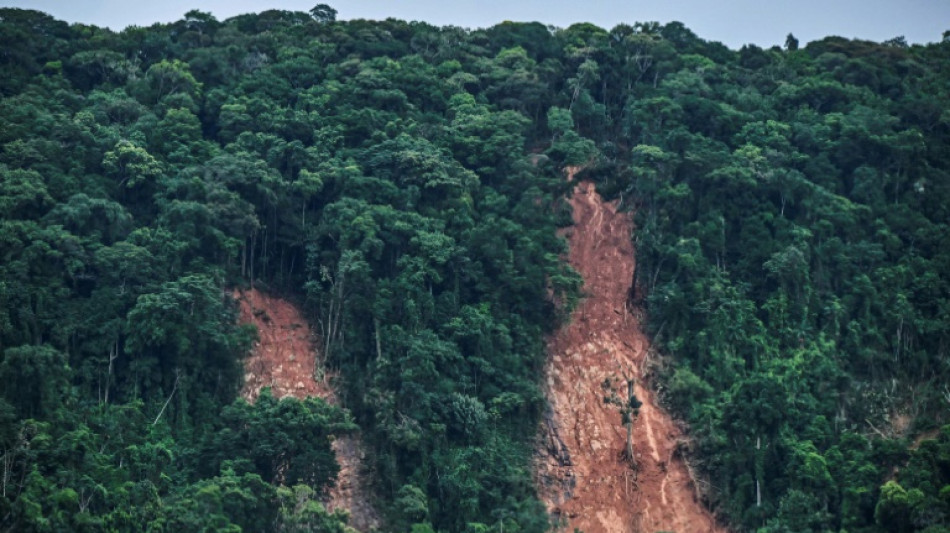
-
 French right-wing TV host fans talk of presidential bid
French right-wing TV host fans talk of presidential bid
-
Two men in court charged with 'moronic' felling of famed UK tree
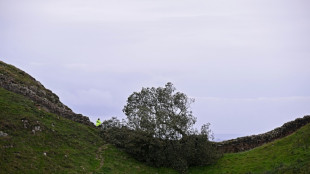
-
 Amnesty accuses Israel of 'live-streamed genocide' against Gazans
Amnesty accuses Israel of 'live-streamed genocide' against Gazans
-
Spotify posts record profit in first quarter

-
 Sciver-Brunt named as England women's cricket captain
Sciver-Brunt named as England women's cricket captain
-
GM profits top estimates, but automaker reviewing outlook due to tariffs

-
 Stock markets edge up as Trump softens tariff pain for auto firms
Stock markets edge up as Trump softens tariff pain for auto firms
-
Pricier trainers? Adidas warns on US tariff impact

-
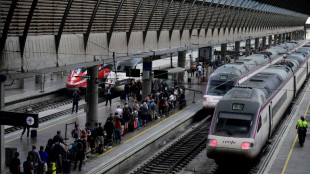 Spain, Portugal rule out cyberattack for massive blackout
Spain, Portugal rule out cyberattack for massive blackout
-
Suryavanshi, 14, dubbed India's next superstar after shattering records

-
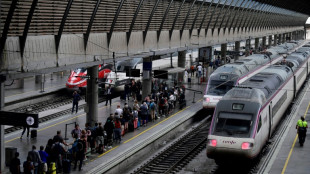 Power back in Spain, Portugal after massive blackout
Power back in Spain, Portugal after massive blackout
-
Pakistan says it shot down Indian drone along Kashmir border
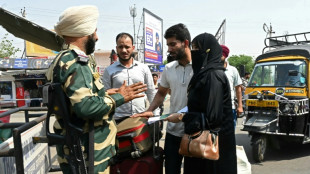
-
 Cardinals run the media gauntlet ahead of conclave
Cardinals run the media gauntlet ahead of conclave
-
BP profit drops 70% amid pivot back to oil and gas

-
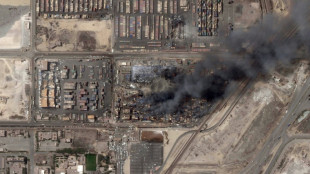 Iran says fire contained after deadly blast at key port
Iran says fire contained after deadly blast at key port
-
Irish rappers Kneecap deny support for Hamas, Hezbollah

-
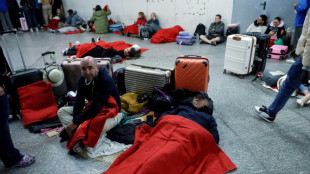 Blackout plunges Spain into chaotic night of darkness
Blackout plunges Spain into chaotic night of darkness
-
Convicted cardinal confirms he will sit out conclave

-
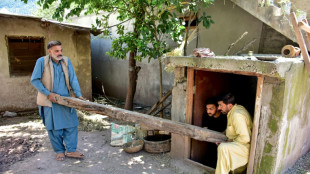 Kashmiris fortify bunkers anticipating India-Pakistan crossfire
Kashmiris fortify bunkers anticipating India-Pakistan crossfire
-
Adidas warns US tariffs to push up prices

-
 Markets boosted as Trump softens tariff pain for auto firms
Markets boosted as Trump softens tariff pain for auto firms
-
Suryavanshi, 14, dubbed 'next superstar' after batting records tumble

-
 Australian doubles player Purcell accepts 18-month doping ban
Australian doubles player Purcell accepts 18-month doping ban
-
Kashmir attack unites political foes in India, Pakistan
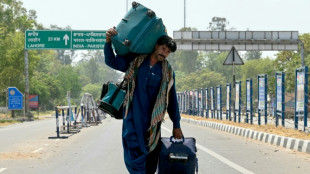
-
 Croatia hotel toasts dizzying century of stars, sovereigns and champagne
Croatia hotel toasts dizzying century of stars, sovereigns and champagne
-
Kenya's desperate need for more snake antivenom

-
 Les Kiss in frame with Wallabies set to name new coach
Les Kiss in frame with Wallabies set to name new coach
-
Cavaliers scorch Heat, Warriors down Rockets in thriller

-
 Opposition wins Trinidad and Tobago election, returning Persad-Bissessar as PM
Opposition wins Trinidad and Tobago election, returning Persad-Bissessar as PM
-
Study sheds light on origin of Australia's odd echidna

-
 France tries Syrian Islamist rebel ex-spokesman on war crime charges
France tries Syrian Islamist rebel ex-spokesman on war crime charges
-
Trump boasts of 'fun' 100 days, but Americans disenchanted

-
 Elitist no more, caviar is turning casual
Elitist no more, caviar is turning casual
-
Amnesty accuses Israel of 'live-streamed genocide' against Gaza Palestinians

-
 Inter slump puts season at risk ahead of daunting Barca trip
Inter slump puts season at risk ahead of daunting Barca trip
-
Power returns to most of Spain, Portugal after massive blackout
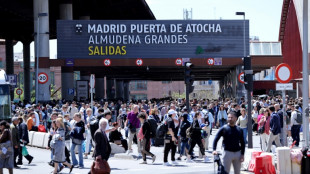
-
 'I have hope': Vietnam Babylift survivor's search for birth mother
'I have hope': Vietnam Babylift survivor's search for birth mother
-
US climate assessment thrown into doubt as Trump dismisses authors
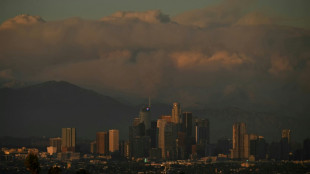
-
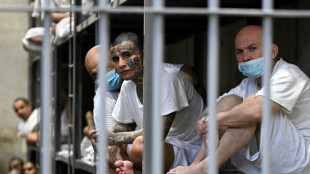 Venezuelan president slams US over little girl's 'abduction'
Venezuelan president slams US over little girl's 'abduction'
-
Hard-right upstarts eye big gains in local UK polls

-
 Skulls, smoke and spirits: Thai ceremony for the unclaimed dead
Skulls, smoke and spirits: Thai ceremony for the unclaimed dead
-
Canada's Carney: political newcomer who says he's best in a crisis

-
 Cavaliers scorch Heat to seal series sweep
Cavaliers scorch Heat to seal series sweep
-
Dead salmon create election stink on Australian island
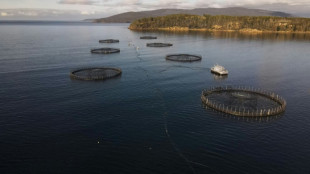
-
 Mic check: Singapore's podcast boom amplifies opposition voices
Mic check: Singapore's podcast boom amplifies opposition voices
-
Markets rise as traders gear up for earnings, key jobs data

-
 Congress passes 'revenge porn' ban, sending it to Trump
Congress passes 'revenge porn' ban, sending it to Trump
-
Spain and Portugal work to restore power after massive blackout
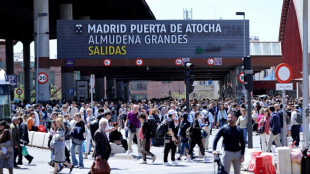
-
 Less-thirsty rice offers hope in drought-stricken Chile
Less-thirsty rice offers hope in drought-stricken Chile
-
Yamal stardust could give Barca edge on Inter Milan


Climate change, rampant urbanization fuel Brazil storm disasters
Climate change and unchecked construction in flood- and landslide-prone areas are making disasters like the violent storm that killed at least 48 people in southeastern Brazil ever more frequent, according to a leading expert.
Francis Lacerda, a researcher at Brazil's IPA Climate Change Laboratory, spoke with AFP about the forces driving disasters like the one that hit the coast of Sao Paulo state last weekend, and what can be done to stop them.
What is causing so many tragedies like this in Brazil?
"It's a consequence of global warning, which has generated more extreme weather events not just in Brazil, but across South America and the entire planet.
"There has actually been a decrease in the total amount of rain in Brazil in the southeast, central-west, north and northeast in the past 30 or 40 years, even as these extreme episodes have increased.
"The large amount of heat in greenhouse gases is being absorbed by our oceans, which is changing ocean currents. That's causing changes in the way heat is distributed at Earth's poles and the equator, and the atmosphere responds with these extreme weather events.
"So total precipitation has decreased, but the distribution has become more intense, with an entire year's worth of rain falling in a few hours in some cases."
Is entire country at risk?
"Yes, although mountainous areas are at higher risk.
"On the Sao Paulo coast, for example, the phenomenon was intensified by the mountain range and the arrival of a cold front with high-speed coastal winds. But rain like that can also occur in coastal areas without mountains."
Could deaths have been avoided?
"It was a tragedy foretold. A day before the storm, meteorological models started indicating a high probability of a phenomenon like this. It would have been possible to get enough information to emergency officials to evacuate these areas and save lives.
"Governments at the city, state and federal levels are unprepared for climate change. We need adaptation and mitigation plans."
Millions face such danger. How does Brazil address it?
"Real-estate speculation has basically pushed poor people on the urban periphery into these high-risk areas. They have no other option.
"It's not enough to just say, 'Get those people out of there.' We need to fundamentally reexamine our cities with a view to reformulating urban public policies.
"There are a lot of things that can be done, including fixing the lack of decent housing."
M.Thompson--AMWN